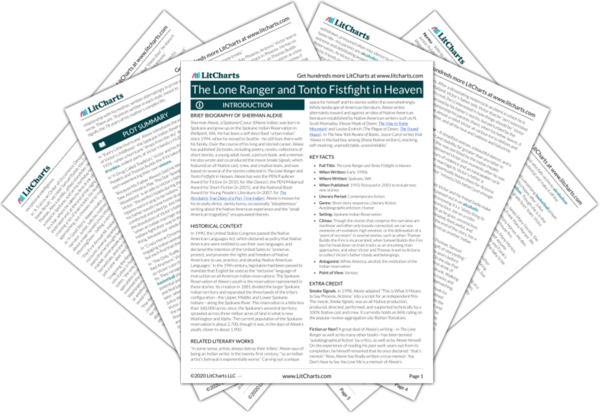Summary
Analysis
In the middle of the night, unable to sleep, Victor, again the narrator, walks through the streets of Spokane. He heads for the 7-11 to get a Creamsicle, and “the company of a graveyard-shift cashier.” He remembers his own time working at a 7-11 in Seattle, where he was robbed and locked in the cooler. When Victor enters the 7-11, the cashier greets him, and gives him a long look, “so he could describe [Victor] to the police.” Victor says the look is a familiar one. “One of [his] old girlfriends said [he] started to look at her that way, too, not long [before] she left [him.] When one person starts to look at another like a criminal,” Victor says, “the love is over.”
Victor is living away from the reservation, plagued by insomnia and memories of a failed relationship. He exists not in the realm of imagination and vision, as he has in other stories, but of memory and recollection. Themes of community versus isolation and love versus hatred dominate this story, which more or less rounds out Victor’s arc throughout the text (and gives the book its title), as Alexie explores some large and explosive emotions through his character.
Themes
Victor reminisces about his ex, a white woman he used to live with in Seattle. They fought terribly and often and, in the wake of their fights, Victor would get into his car and drive aimlessly. He started taking the late night shifts at 7-11, he says, to spend as little time with her as possible.
Victor’s restlessness and ambivalence are at the forefront of much of his decision-making in his memories of his time in Seattle. He feels isolated and full of pain, and longs for an escape.
Themes
Victor takes a Creamsicle from the refrigerator. He can tell that the clerk is nervous to have him in the store. When Victor approaches the counter to pay for his ice cream, the clerk makes some nervous small talk. Victor thinks he seems lonely. Victor baits the clerk a little bit, trying to increase his nervousness, but then he lets him off the hook with a joke. The clerk gives Victor the Creamsicle for free, and Victor leaves. He walks home and lets the Creamsicle melt in his hands, trying to act “as young as [he] want[s]. There [is] no one around to ask [him] to grow up.”
The 7-11 clerk treats Victor suspiciously, judging him entirely by the color of his skin. However, Victor knows that the two of them are more alike than it seems—he remembers his own time as a 7-11 clerk, and he is eventually able to connect (somewhat) with an individual who was attempting to judge and isolate him. Victor then tries to find solace in a vague escape back to childhood.
Themes
Victor flashes back to Seattle, where, during intense fights with his ex, he “broke lamps.” His ex-girlfriend would replace the lamps when the fights were still new and infrequent, but eventually she gave up, and the two of them, Victor says, would “argue in the dark.” The two never hurt each other physically, Victor says, but their fights proved “just as damaging” as if they had. They insulted each other often; Victor teased her about her job as a kindergarten teacher, and she berated his drinking. Victor began having disturbing dreams, and often saw himself as a doomed war chief, or witnessed horrible acts of violence perpetrated by whites against Indians and Indians against whites. After one particularly awful dream, Victor left in the middle of the night. As he did, his ex told him that she loved him, and that she never wanted him to come back. Victor returned home to the Spokane Indian Reservation.
The repetitive lamp-breaking, though a frightening, violent, and very real act, is nonetheless symbolic of a continual dimming of understanding and truth in the relationship, until both are “in the dark.” Victor is a character often very attuned to and sometimes ruled by dream logic, and here we see how his dreams affected a major decision in his life—to return to the Spokane reservation of his youth and escape a violent, difficult, isolating situation.
Themes
Get the entire Lone Ranger and Tonto Fistfight in Heaven LitChart as a printable PDF.

Victor finishes his Creamsicle and arrives home. He is still unable to sleep, so he picks up an old newspaper and reads about war, bombings, and crime.
Victor is unable to sleep because of disturbing dreams, both in the past and present; his reality is no less full of violence and loss.
Themes
When Victor arrived home on the reservation after leaving his girlfriend, his family was unsurprised by his return. Listless and sad, he did little at first but watch television. When he got tired of watching TV so much, he started playing basketball again, shooting hoops alone. After a few weeks of solo practice, he joined a game at the gym, where he was beaten by a white man. The next day, Victor drove to Spokane to get a job, and has been working at the high school exchange program “ever since.” One day, a few months after he started the job, his ex-girlfriend called. He told her he’d been sober for almost a year, and apologized for all that happened between the two of them.
Victor, home and still suffering from pain and isolation, sought escape through television and basketball. He eventually realized more tenable escapes, such as obtaining a rewarding job, becoming sober, and even attempting to amend a broken relationship.
Themes
In the present, Victor wishes he lives “closer to the river, to the falls where ghosts of salmon jump.” A chronic insomniac, Victor wishes he could sleep, but accepts his condition. “I know how all my dreams end anyway,” he says.












